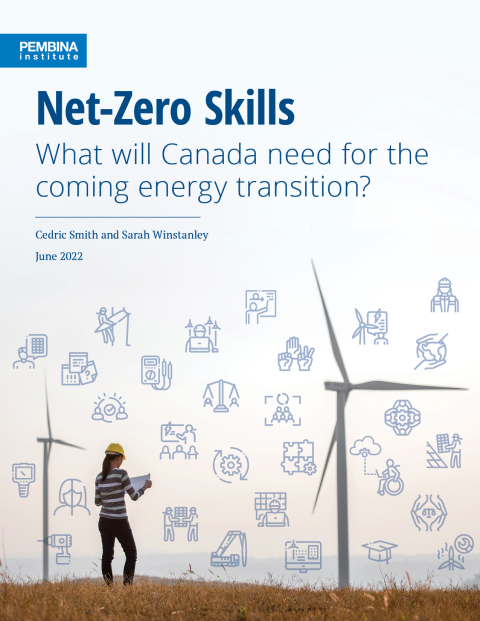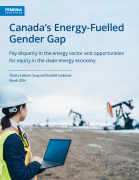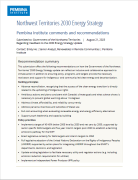A transition of Canada’s energy sector is coming, and governments, businesses, workers’ associations, and individuals need to prepare, plan, and reskill so that the country can take advantage of the ensuing opportunities. Countries, sub-regions, and cities have signed on to try to keep the world from overheating by attempting to reach “net-zero” by 2050. Earlier this year, the Government of Canada released the 2030 Emissions Reduction Plan, which outlined a sector-by-sector path for Canada to reduce emissions to 40% below 2005 levels by 2030. Now governments, including Canada, need to plan for how to reach climate goals without causing undue disruption to workers and the economy.
The energy transition will result in a decline in fossil-fuel based energy industries (oil and gas and coal) and a growth in renewable and other low-carbon energy-producing industries, such as solar, wind and hydrogen. Exactly how this transition will occur, as well as which low-carbon energy producing technologies will be adopted, is unknown and subject to policy levers by Canadian governing bodies as well as international market demands.
Not only are the sources of energy going to change, but the sectors that use that energy, such as buildings and transportation, will also face disruptions as systems need to be retrofitted, rebuilt, and redesigned.
This report reviews literature to analyze the degree to which existing skillsets in Canada’s fossil fuel labour force can be transferred to a net-zero–aligned economy and identifies the potential skills gaps that may exist. This report also examines the skills that will be required in Canada’s energy end-use sectors, including buildings and transportation. Finally, this report examines existing equity issues within Canada’s energy sector, particularly as they relate to Indigenous rights and reconciliation, as well as gender equity, and how those inequities may be addressed on the path to net-zero.
Key findings
- Skillsets will change but some are transferrable: Energy production and energy use sectors will require different worker skillsets than Canada currently possesses. Nevertheless, the valuable skillsets that exist in Canada’s workforce in the energy-production sectors are transferrable to emerging clean energy sectors. Alignment may not be perfect, and upskilling may be required.
- Inequities persist in the energy labour force: Canada’s net-zero transition offers an opportunity to address long-standing social equity issues in the workforce and create a more equitable economy. Women have been historically excluded from the energy sector due to barriers that show up for them all along the energy career pathways. Costs for training and reskilling have been a barrier for many marginalized groups, and newcomers may face difficulties in accessing job opportunities without policy intervention.
- Significant investments in STEM education, high technical, and soft skills are required: The low-carbon economy (both energy production and energy end uses) will require more technical expertise, spread across the country. The transition to net-zero will continue to require soft skills to support collaboration and partnership-building, and greater literacy on sustainability and climate principles and standards.
- Further labour data analysis and research is needed: Further data collection and research is needed to understand what skills are transferable as well what skills are needed in each sector as Canada transitions to a net-zero economy. Having more certainty about Canada’s unique path to net-zero will greatly help the planning for the labour force.
Recommendations for the federal government
1. Chart a clear course to net-zero for Canada:
Canadians need to know where we are going and how fast we are trying to get there. While the federal 2030 Emissions Reductions Plan is an important signpost for net-zero planning, the federal government should continue work to set an ambitious course to 2050, acknowledging that much depends on the rigorous implementation of necessary policies and regulations, many of which cannot be dictated by the federal government. To achieve the necessary reductions, the federal government must partner with, coordinate between, and support other levels of government, Indigenous peoples and communities, educators, business, and labour groups. In order to ensure Canadians and communities are not left behind, part of that planning needs to identify pathways that will result in well-paying jobs across the country.
Some steps that the federal government can take:
- Deliver Canada’s commitment to a net-zero transition by implementing supportive policies and plans
- Consult with stakeholders and partners to set Canada’s net-zero pathway and establish sectoral milestone targets along the way
- Plan and invest in low- and zero-emission technologies and economic development activities that will support a net-zero transition
2. Fund research to understand labour and skills impacts
Support research that will help employers and policymakers understand how the net-zero transition will impact the energy sector and labour force. Detailed modelling on future skills in a net-zero economy will help relevant stakeholders better prepare for changes and fill skills gaps.
3. Support fair outcomes for impacted labourers
Support fair outcomes for labourers impacted by the net-zero transition by listening closely to the results of Canada’s ongoing Just Transition consultation and providing support for worker upskilling that is commensurate to the needs of a net-zero transition.
- Provide financial support for worker upskilling and training
- Align ongoing federal skills programming with climate change efforts
- Support workers with career pathways including the choice of early retirement
4. Improve outcomes for historically excluded groups
When developing policies and investments to support the net-zero transition, governments should continue to implement practices that strives to create equitable working conditions and work force.
- Continue to apply a GBA+ lens to federal transition policies and programs, and publicly report on the impact
- Prioritize the collection and transparent, ethical use of disaggregated data
- Address mental health as part of skills training as shifts in one’s job and skillsets may cause emotional distress, sense of loss or mental health impacts. Policies and practices that prevent harassment and violence should also be prioritized.
5. Support Indigenous rights and reconciliation
The energy transition must result in the self-determination, sovereignty, and economic security of Indigenous peoples and communities. The United Nations Declaration on the Rights of Indigenous Peoples (UNDRIP) states that Indigenous peoples have the right, without discrimination, to improve their economic and social conditions, and the right to determine and develop strategies to develop or use their lands, territories and other resources. UNDRIP provides a framework for developing renewable energy projects.
- Invest in and scale up Indigenous-led training, employment, and mentorship programs
- Invest in Indigenous-led renewable energy and energy efficiency projects







